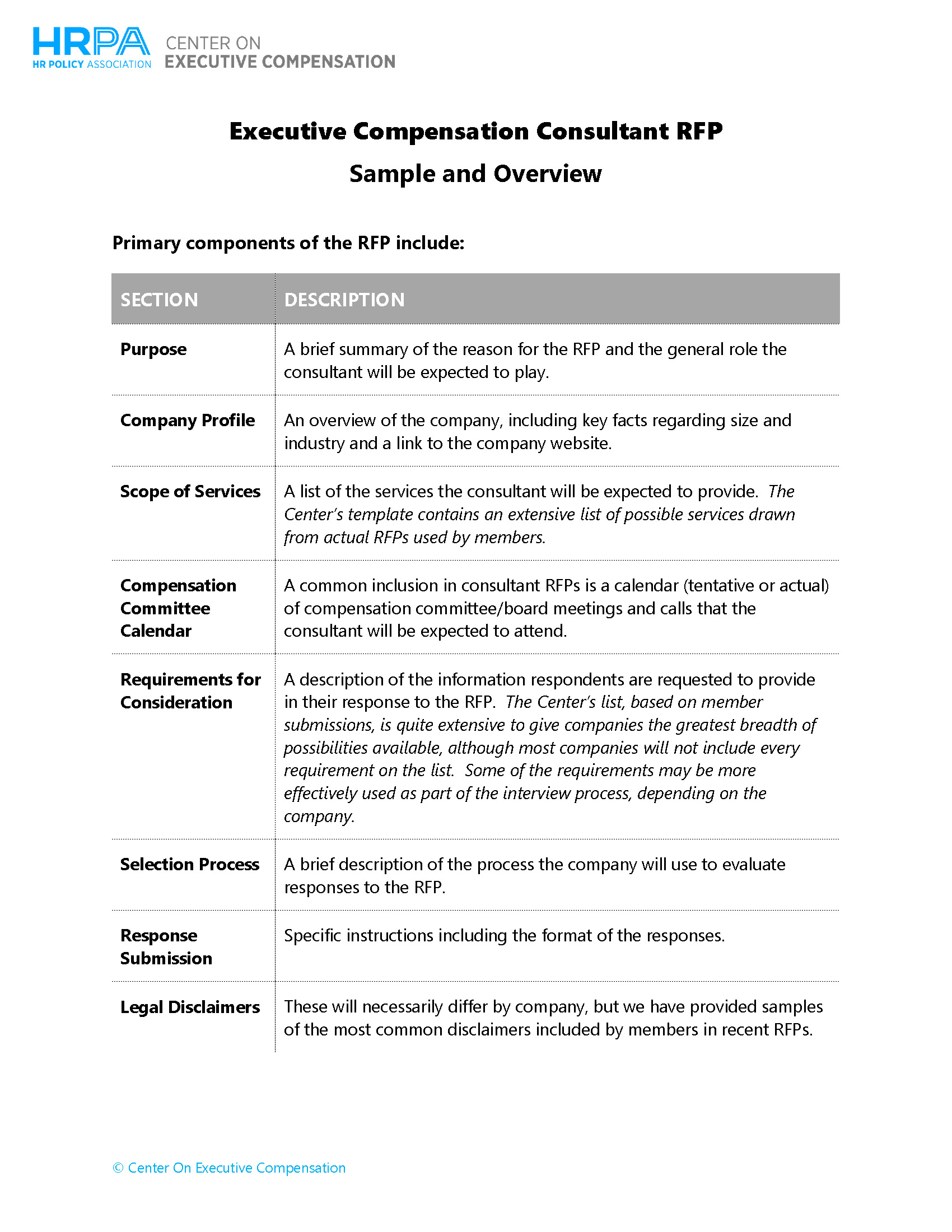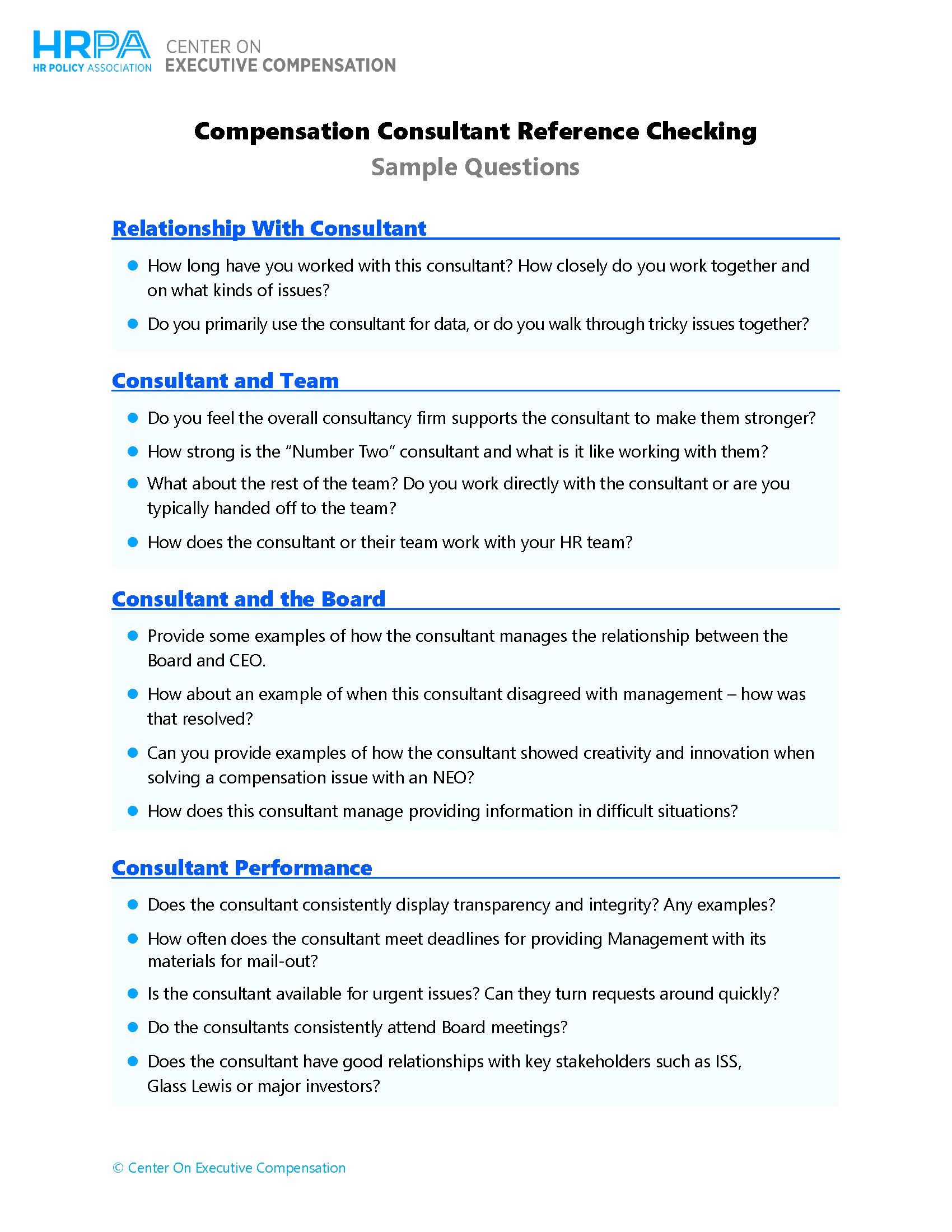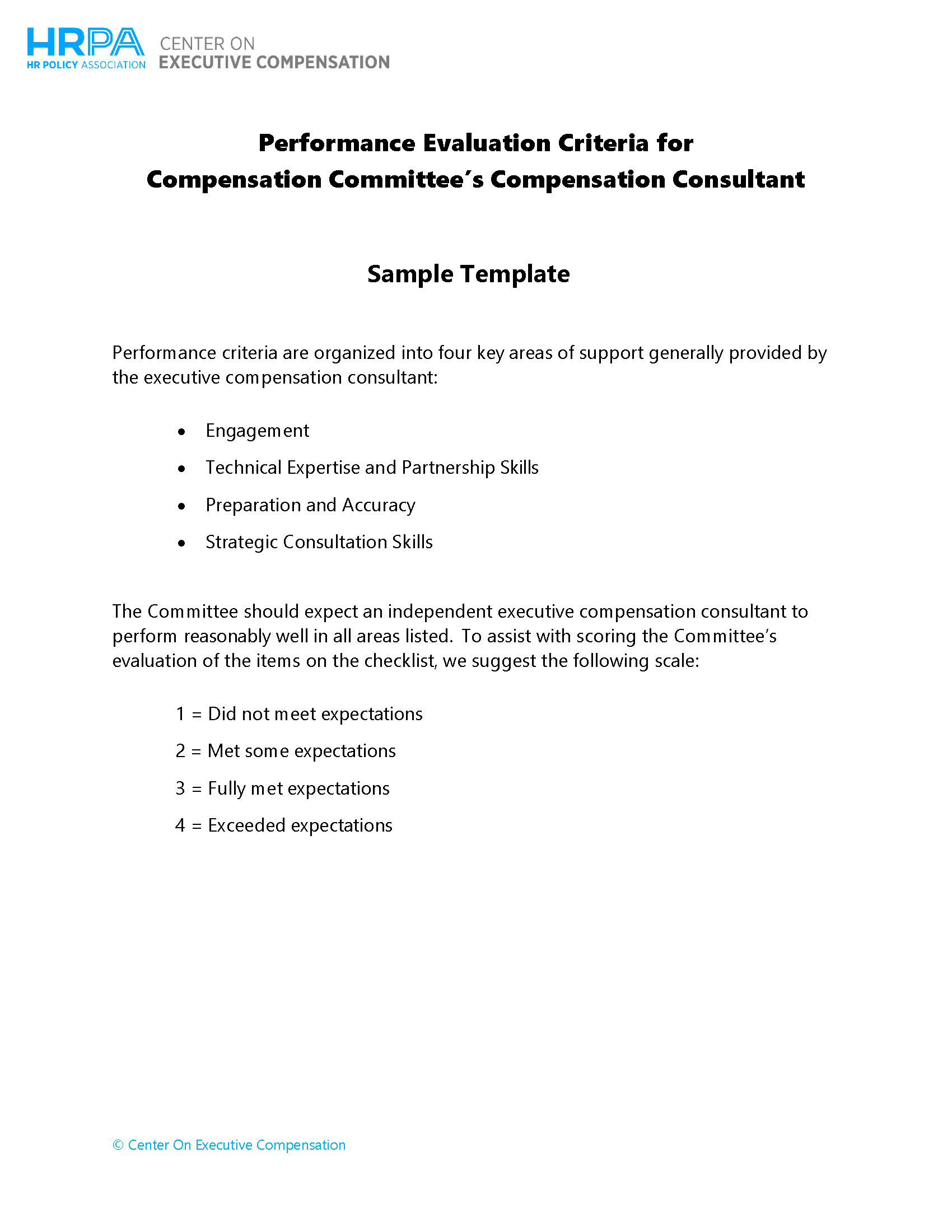
Selecting an Independent Compensation Consultant
Each company is unique in its approach to the evaluation and selection of an independent compensation consultant. A good consultant will ensure that the Compensation Committee’s decisions are fair, reasonable, and support the company's mission. It is crucial that CHROs arm their Committees with clear direction to ensure an efficient process, smooth transitions, and a favorable outcome. Useful to new and experienced CHROs alike, this practical Guide is a collection of the tools, tips, and insights necessary to successfully navigate the review and selection process.
Contents of this Guide
As the Compensation Committee takes on ever-increasing responsibility for overseeing the compensation plans, pay governance, and human capital policies of a company, the selection of a compensation consultant is of paramount importance. A good independent consultant will ensure that the Committee’s decisions regarding executive pay and benefits are informed by relevant information, fair, reasonable, and assist with supporting the company’s strategic direction. Their expertise, independence, objectivity, and focus on legal compliance make them an invaluable resource. Given the importance of the consultant, it is incumbent on any CHRO to ensure their company has a clear policy and process for assisting the Compensation Committee with the review and selection of a consultant. The Center On Executive Compensation has advised companies on this critical task for years, and we hope this Guide will combine time-tested strategies and new insights to make the process as efficient and effective as possible. | ||||||||
Based on interviews with 13 Compensation Committee Chairs, CHROs, and compensation consultants of large companies across multiple sectors, this Guide combines their experiences and expert advice on selecting an independent compensation consultant. Useful to new and experienced CHROs alike, here you’ll find a curated collection of insights, tips, and tools for successfully navigating this process. Examine chief observations regarding the common triggers for conducting a search, learn who is involved and how the process is orchestrated, review crucial evaluation criteria, and discover the benefits of periodically scanning the market for compensation consultant talent. Each company is unique in how it approaches the evaluation and selection of a consultant. Master the prevailing policies and trend-forward “best practices” that characterize the most effective and well-run processes. |
|
Factors Triggering a Change
A recent Center On Executive Compensation survey found that most companies do not have a set policy or practice regarding rotation of compensation consultants; instead, the process is most often triggered by a specific event such as a change in Compensation Committee Chair. However, effective Compensation Committees will often put more structure around this undertaking to ensure smooth transitions and an efficient process.
The most common triggers include:
Change in Compensation Committee chair. By far the most common trigger for a potential change in compensation consultant. A natural inflection point, the new Chair almost always uses this opportunity to “take the pulse” of their Committee, soliciting feedback on the consultant and the effectiveness of the meetings generally.
Performance of existing consultant. Another common trigger, predictably, is Committee dissatisfaction with the current consultant’s performance (see Performance Evaluation Best Practices below). Increasingly, Committee Chairs are encouraging Committee members to offer feedback early and often to ensure that everyone’s input is heard.
Long tenure of existing consultant. Several interviewees noted that when no specific policy exists around the tenure of a consultant, the Committee sometimes decides that it has been “long enough” and for the sake of good governance, a review is needed. As one CHRO put it, “We had the same consultant for over ten years, and we felt as a matter of good governance we needed to perform a review on a regular basis. We decided to stay with our firm but changed the individual.”
| "More structure is needed to ensure smooth transitions and an efficient process" |
Change in business structure. Another common trigger occurs when the business has undergone a significant change, such as a spin-off or major M&A activity. Where a company has retained the services of the same consultant as the parent company for consistency’s sake, the opportunity is used to review this choice after the dust has settled to ensure the consultant continues to be a good fit for the new business structure. Loss of Say on Pay vote. Although it may seem unfair, the independent compensation consultant is often considered at least partially responsible when a company fails (or receives a low level of support for) its Say on Pay vote. Compensation Committee Chairs often feel that this negative result reflects poorly on the Board’s trusted advisor, especially if the low support was a surprise to the Committee. Justified or not, this is a common trigger point for seeking a new compensation consultant. "Most companies do not have policies regarding rotation of compensation consultants " |
|
Details on the Process
Our interviews delved deeply into the nuts and bolts of the Request for Proposal (RFP) and evaluation processes for the Compensation Committee’s consultant.
Key milestones to consider when designing your own process:
- Who takes the lead?
- Which firms are considered?
- Who submits the RFP?
- Who hears the pitches?
- Checking references.
Who takes the lead? The answer to this question will depend greatly on the preferences of the Compensation Committee Chair. Some Committee Chairs (especially those who were previously CHROs) prefer to initiate and spearhead the process, even engaging directly in the RFP and initial interviews. Others prefer management (usually the CHRO and/or General Counsel) to take the initiative and oversee the process. In all scenarios, it works the best when the Compensation Committee Chair, CHRO and management work together.
Several CHROs and Compensation Committee Chairs admitted they wished they had a more cohesive and detailed policy for evaluating the compensation consultant up front. In the words of one Chair, “If I had to do it differently, I’d have a policy already in place so that both the Committee and the consultant know we have a regular cadence of looking externally.”
Best Practice: Take the time (use this Guide!) to create and circulate a policy regarding when and how the compensation consultant will be evaluated and when an RFP should be conducted. Make sure the consultant is aware of the policy ahead of time – not just when the RFP is about to take place. |
Which firms are considered? Casting a wide net in terms of generating an initial list of firms to be considered is often the best approach. One Chair collected input from each Committee member as well as her own contacts, management, and peer proxies. Another left the initial list generation to the Head of Total Rewards, who winnowed it down before presenting the final list for RFP candidates to the Chair. In general, we found that the initial list of RFP candidates is typically between 4-8 firms, and is then narrowed to a shortlist of 2-4 that are each invited to present a pitch. In almost all cases, the incumbent firm is offered the opportunity to participate in the RFP. In the words of one CHRO, “It behooves you to be transparent with your current firm; not only does word get around, but the incumbent firm will continue to work with the Committee for at least another one or two meetings, even if they aren’t the final selection. You want that to run smoothly.”
Best Practice: Consider a detailed rubric to assist you in evaluating written responses as well as in-person pitches. Find a sample RFP here. |
Primary components of the RFP include: purpose, company profile, scope of services, Compensation Committee calendar, requirements for consideration, selection process, response submission, and legal disclaimers. |
Who submits the RFP? The answer to this question was an area of considerable difference in our interviews. Several said they simply emailed the RFP (see the Center's sample template here) to each firm individually, accepting responses via email in turn – and this was certainly the preferred practice of each of the consultants we interviewed. However, we also heard that a few companies leave this critical task to Procurement, often with less than desirable results.
Consultants often reported receiving pages and pages of largely irrelevant questions, or software that has dozens of questions with character limits for each response, impeding the consultant’s ability to respond thoroughly. As one consultant put it, “Our worst day is when the RFP comes through from Procurement – it puts us squarely in the vendor camp, not the partner camp.” A CHRO noted that “There is a way to work with Procurement through the process while educating them that this particular search will be different and need more flexibility. You can’t apply a one-size-fits-all model to this process – this is the Board using management’s tools to pick their own advisor.”
Best Practice: If your company has a policy of involving Procurement in all supplier negotiations, consider taking the opportunity to collaborate without entirely delegating the RFP process for the Committee’s compensation consultant. This is a very special advisor to the Board – the selection process will benefit from the close involvement of the CHRO or another member of management as well as Procurement colleagues. As one CHRO put it, “The interaction with the consultant is a reflection of the Board to the marketplace. You don’t want to get it wrong.” |
Best Practice: Limit the length of the RFP to the questions the Committee really needs answered – not boilerplate supplier questions that everyone will answer the same way or that aren’t relevant to this type of search. Review RFP questions with Committee members in advance as they may have good suggestions for additional questions. |
Who hears the pitches? Once the RFPs come in, the real work begins – evaluating each response and selecting finalists for a shortlist. Don’t be alarmed if you receive a few polite responses declining to take part in your RFP – consultants sometimes decline due to conflicting Committee meetings, too many clients, or conflicts with other lines of business.
Once a shortlist of 2-4 candidates has been selected (either by the Chair or management), each candidate is typically invited to present a “pitch” to the Committee. In some cases, the Chair fulfils this role for the Committee, offering only the final two, but most Committees prefer to hear all pitches.
Arguments both for and against in-person pitches exist. Although it is certainly easier to gauge fit and ask questions in person, it requires more of the Committee’s time. One CHRO noted that if he could do it differently, he would give more time for each firm’s pitch: “I think it would have been beneficial to have them come in-person and I would extend their pitch time – 30 minutes was not long enough. We needed more time for back-and-forth questions.”
Best Practice: Make sure both management and the Committee are present for the pitches, |
Best Practice: Consider innovative alternatives to the standard “elevator speech.” One consultant suggested assigning each finalist a small project to work on, “to get a feel for how someone will consult. You will see how they interact with you, data they bring to bear and how they think about your issues.” |
Checking references. Both companies and consultants agree that reference-checking, while critical, is often not as effective as it could be. It takes effort to “get beyond the boilerplate” and really probe a reference regarding how their consultant operates. Find a list of sample questions to ask for a reference that will go beyond the superficial and provide practical insights into consultants’ interactions with the company and the Board. |  |
| "Reference-checking, while critical, is often not as effective as it could be" |
Best Practice: One CHRO suggested that although current references are helpful, there is some self-selection as they are obviously happy with their consultant, or they would have changed. Consider asking for prior clients. |
Best Practice: In addition to the CHRO (who is an excellent choice for checking references given their typically extensive experience in interviewing), consider having the Chair conduct their own references with other Chairs. One Committee Chair noted she always calls the Chair directly because “they are often willing to share more with me than they would be comfortable sharing with management – and an email from me gets their attention.” |
Criteria for Evaluation and Selection
One of the trickiest parts of any consultant RFP is determining the most important criteria for your Compensation Committee and your company. Most of the best-known consultants score top marks in general expertise and technical competence – but that is only one aspect of working with the Committee. Considering questions like these upfront will help narrow down the kind of consultant the Committee prefers. |
| One leading compensation consultant advises companies this way: "First, decide on your priorities – how do you want to use a consultant? Some consultants have a deep dive approach which lends itself to fewer clients, but some companies might not need that level of engagement – they only want a reviewer to give the Committee things to think about. How important is the network the person brings, industry expertise, or a broader set of skills like ESG and human capital management?" |
Common criteria. Note that some of these criteria will be more important to your company than others – the key is to determine which matter to you, before the interviews begin.
- Creativity and innovation when problem-solving.
- Ability to work with management team (including the compensation team) and not just the Board.
- Evidence of good succession planning internally and a strong “Number Two” partner.
- Ability to engage in dialogue as a true thought partner versus providing canned analyses. “We want someone who can customize their toolkit to what’s important to our company.”
- Industry knowledge – but as one CHRO said, “Don’t over index on this. Issue expertise may be more important than specific industry experience.”
- Size of firm – sufficiently large to add value in multiple areas including governance, best practices, and legal/tax issues.
- Sufficient gravitas and depth to go toe-to-toe with healthy egos on the Board.
- Clear explanation of how they “crunch the numbers” – what is the support team like and is there a quality process for ensuring accuracy so that Board members aren’t identifying mistakes?
Some pearls of advice on how to evaluate the consultant:
Management and Committee Rapport
- “It’s super important to me that the consultant works well with the management’s compensation team. You have to feel you connect with the consultant – that they have the appropriate balance between disagreeing when they need to and not being disagreeable.”
- “Avoid a consultant that only wants a relationship with the Board. Make sure to meet the entire team and see how the main consultant operates with them.”
- “Will this person be not just an expert but a good thought partner who will brainstorm with you about your situation?
- “Can this person have hard conversations but not ruffle feathers along the way?”
Consultant Preparedness
- “Ask to see materials in advance to assess clarity and effectiveness.”
- “I looked at how much “homework” they did – how well versed were they in our issues? One way to get at this is to ask what they thought of your most recent Investor Day.”
- “How did they come across in virtual sessions – how did they answer questions and show authenticity and humility?”
Consultant Experience and Knowledge
|  |
Performance Evaluation for the Consultant
The overwhelming majority of survey respondents reported they evaluate the consultant’s performance on an annual basis – a significant increase from the Center On Executive Compensation’s September 2021 survey. Many interviewees stressed the importance of formal or semi-formal performance evaluations annually in which feedback from the Compensation Committee and management is solicited.
Best Practice: Conduct a performance evaluation annually and have the Compensation Committee Chair deliver the feedback personally to the consultant. One Chair described a situation she faced in which the consultant had no idea that management was dissatisfied with their performance. “Ensure you are diligent about annual feedback for the consultant, so you don’t wind up in this situation where they are surprised. This needs to go on the Committee’s calendar,” she advises. |
Benefits of an RFP
According to the survey, approximately 28% of Center On Executive Compensation members have recently undertaken a compensation consultant RFP – and of those, about 71% resulted in a new compensation consultant for the Committee. CHROs, Compensation Committee Chairs, and consultants were asked about their views on the benefits of an RFP and how frequently one should be done. None of the company leaders we spoke to regretted doing an RFP – in fact, several of them said they wished they had done one sooner, even if it resulted in keeping the same consultancy firm, if not the same individual consultant. The benefits of doing an RFP included following “good corporate governance,” exposing the Committee to new perspectives and options, and improving the quality of advice as well as the effectiveness of Committee meetings. Most agreed that although an annual evaluation of the consultant’s performance is essential (see a sample evaluation form here), when considering a full RFP, every five years or so is more appropriate. “I don’t think there needs to be a time limit on consultants – it’s disruptive and you lose history,” said one CHRO. “However, practice good governance hygiene by evaluating the consultant regularly to ensure they’re adding value and that neither the CEO nor the Board are getting their own way all the time!” A Committee Chair laughed, “I don’t know what the right timing is – but I do know that 20 years is too long!” | "Several company leaders wish they had done an RFP sooner" "Practice good governance hygiene by evaluating the consultant regularly to ensure they’re adding value" |
Onboarding the New Compensation Consultant
Once the consultant has been selected, set them up for success by ensuring a robust and fulsome onboarding process takes place. The new consultant will need clarity on how the Chair prefers to work with them, the range of fees that are expected, and what the expected relationship with management. For example, will the CHRO and the consultant interact without the involvement of the Chair, or should there be more of a separation? Will management have its own consultant for executive pay matters, or will they be using the Committee’s consultant?
Best Practice: Don’t forget to provide feedback to the consultants who are not selected. As a leading consultant told us, “This often does not occur and is critically important to the consultants’ internal review process and keeping their business models and service offerings current, not to mention simply being considerate of the time and effort that goes into responding.” |
One Chair explained her process as follows: “We make it clear that as our consultant begins the first year of engagement, they’re investing in long-term relationship. We will ask that the time they spend getting to know the company isn’t billed at an excessive rate – a bit of a first-year bump is expected, but not high hourly rates for that first year.” A CHRO added, “We always ask the firm to go through the whole year – review the proxy, Committee agenda and minutes – and then come back with tweaks or comments on what we should be doing differently.” Some consultants may suggest spending time with members of management such as the CEO, CFO, CHRO, General Counsel and business line leaders in the early days to understand the business more deeply. In general, the more access consultants have to company leaders in the first year, the more effective the onboarding will be. | "Set your consultant up for success and invest in a long-term relationship" |
Best Practice: One CHRO noted he asked the old and new consultants to do a “handover” meeting to ease the transition. Depending on the circumstances, this is an excellent way to onboard the new consultant and prepare them for success. |
For more information on the process of selecting an independent compensation consultant, contact Center On Executive Compensation President and CEO, Ani Huang at [email protected].
Individuals Interviewed
COMPENSATION COMMITTEE CHAIRS
Kathleen “Katy” Barclay, Five Below
Mirian M. Graddick-Weir, Booking Holdings, Inc.; Yum! Brands
Nancy A. Reardon, Big Lots Stores, Inc.; Signet Jewelers Limited
David A. Rodriguez, American Woodmark; Globe Life; SIOP Foundation
Laurie A. Siegel, Direct Relief; FactSet; Lumen Technologies
CHROs AND HEADS OF TOTAL REWARDS
Marc Howze, Deere & Company
Tracy Keogh, Great Hill Partners
R. Scott Matarese, Bristol Myers Squibb
Angela Santone, AT&T
Bala V. Sathyanarayanan, Greif
COMPENSATION CONSULTANTS
Blair Jones, Semler Brossy
Ira Kay, Pay Governance
George Paulin, Meridian
METHODOLOGY
This Guide is based on interviews conducted by the Center On Executive Compensation of 13 Compensation Committee Chairs, CHROs, and Compensation Consultants of large companies across multiple sectors regarding their experiences, learnings and advice on the selection of an independent compensation consultant. We hope the Guide will be useful to new and experienced CHROs alike as a collection of insights and tips for helping shepherd and plan this process.
ABOUT THE AUTHORS

Ani Huang
Senior Executive Vice President, Chief Content Officer, HR Policy AssociationCEO, Center On Executive Compensation

Richard R. Floersch
Senior Strategic Advisor, HR Policy Association and Center On Executive CompensationFURTHER READING
APPENDIX
ABOUT THE CENTER ON EXECUTIVE COMPENSATION
In partnership with HR Policy Association, the Center On Executive Compensation is dedicated to developing and promoting principles-based executive compensation, human capital management and corporate governance practices while advocating for public policies that best serve the interest of shareholders, employees and other corporate stakeholders.
Led by Ani Huang, the Center On Executive Compensation functions as an extension of your total rewards team, providing pertinent subject matter expertise as well as an independent perspective on all aspects of executive compensation, corporate governance, public policy and more. The Center utilizes a “high touch” approach to provide its members with timely research, current regulatory developments, and customized training. Our goal is to ensure that each member and their team has the knowledge, tools and confidence necessary to elevate performance and increase the effectiveness of their Compensation Committee and CEO.
A Center premium membership is available exclusively to HR Policy members. For a single annual fee, enjoy unlimited access to the Center’s essential benefits. Center members may also grant access to representatives from their organizations at no additional charge – from HR teams to in-house counsel and Corporate Secretary roles.
To learn more about becoming a Center member, please contact Christen Supplee at [email protected].





